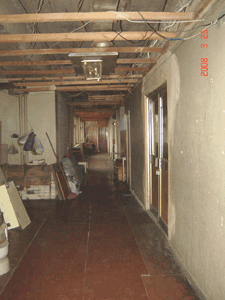Tamta Kakauridze, Zestaponi
 The government of Georgia often boasts about the development of hospital sector in the country and about the construction of new hospitals in the regions. In fact, the doctors of the region-based hospitals know the real situation better of all. Nobody knows what will happen with the hospitals which are somehow working now; most of them require serious reconstruction.
The government of Georgia often boasts about the development of hospital sector in the country and about the construction of new hospitals in the regions. In fact, the doctors of the region-based hospitals know the real situation better of all. Nobody knows what will happen with the hospitals which are somehow working now; most of them require serious reconstruction.
Zetaponi is known as one of the most polluted industrial towns of Georgia. Despite similar
unofficial status, the residents of Zestaponi do not have minimal conditions to take proper medical tests and treatment in the town. The department for infection diseases in Zetaponi district hospital serves residents of three districts – Zestaponi, Kharagauli and Terjola. The hospital urgently needs reconstruction.
Zestaponi District Hospital, Ltd (with 100 % state share) is located in three buildings: four-storied main building; two-storied department for infection diseases and three-storied building of the former children’s hospital. Only three stories are working in the main building; the children’s hospital is completely destroyed (the children’s department works in the main building); the infection department is in the separate building which has damaged roof and in rainy day the water leaks into the hospital; because of this problem the second floor of the building is closed and only the ground floor is working which is also in poor conditions.
“Patients will not stay in such a hospital. The building is pulling down. We have petitioned to the local authority and the ministry of healthcare several times but there have been no results yet; though they promise to resolve our problems after the elections but I think their promise is still unreal. The ministry of healthcare intends to build a new hospital in the district and why should they reconstruct our destroyed hospital?! Besides that, as far as I know, the state did not include the department for infection diseases in the project of the new hospital at all. The hospitals for infection diseases are only in Tbilisi, Kutaisi and Batumi; so our residents will have to go to these cities when they have infection problems,” said the head of the department Anzor Kapanadze.
The director of the Zestaponi district hospital Sergi Maghlakelidze stated that the hospital has not been repaired since 1988. In 2005 only the roof of the main building was repaired with financial assistance of the health ministry and local administration; the allocated sum was enough only for the roof.
The state regulation agency of medical activities, according to the order of the deputy minister of labor, healthcare and social welfare of Georgia, set up a commission in February of 2010 to study the situation in the hospital which prepared a special conclusion. The document states that reconstruction activities shall start in the department for infection diseases in May of 2010.
“Despite the conclusion, they are not going to reconstruct the hospital at all. They sent this letter to us ust to make the organizations concerned about our fate silent,” said Sergi Maghlakelidze in his interview with the humanrights.ge
The Imereti regional office of the Human Rights International Organization also got interested in the situation of the hospital. On January 8, 2010 the organization petitioned to the minister of labor, healthcare and social welfare Aleksandre Kvitashvili. The organization pointed out in the petition that in addition to unbearable conditions in the hospital, there are not enough supply of medicines in it. After the petition, the Regulation Agency examined the infection division but their conclusion did not mention those problems at all.
Sergi Maghlakelidze said they did not have problems in the supply of medicines.
“In 2009, we received more than enough medicines by humanitarian aid. During the H1N1epidemics in Georgia (December of 2009 and January-March of 2010) the state supplied us with free medicines (Tamiflu and substitutions). The state completely reimbursed all the expenses of the hospital in that period of time which amounted to 28 000 GEL. The local government funds the certain amount of A and B Hepatitis. 10 000 GEL is allocated to the hospital for these diseases annually. As for insurance companies, they do not fund infected patients,” said Maghlakelidze.
During the virus period of 2009-2010 about 180 patients applied to the Zestaponi hospital. Most of them took out-patient treatment; while the patients with acute forms of infections were treated in therapy department.
Nobody knows the future fate of the Zestaponi district hospital. Nobody knows when the new hospital with European standards will serve the district.
News
December 13, 2023
Ethnic minorities outside the peace dialogue
November 6, 2023
‘Peace’ agenda of political parties
Popular
Articles
February 13, 2024



